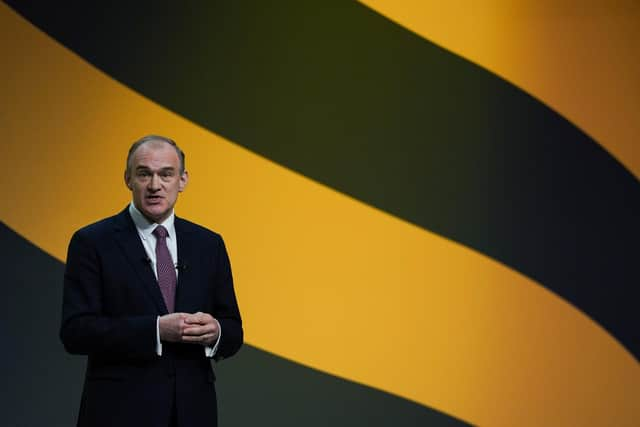Prime Minister Rishi Sunak urged to tackle dental deserts in Yorkshire
Ed Davey, the Liberal Democrat leader, yesterday urged Rishi Sunak at Prime Minister’s Questions to end the “crisis” in NHS dentistry.
Analysis by his party found that across the region there are 2,187 people per NHS dentist, which has risen by 95 since 2015. Meanwhile the number of adults and children seen by an NHS dentist in the last 24 months has fallen to four in 10.
Advertisement
Hide AdAdvertisement
Hide AdData from the Liberal Democrats said that adult and children patients seen by an NHS dentist saw a “staggering” 30 per cent decline since 2015 in Hull.


“Tooth decay is the number one reason that children over four end up in hospital,” Mr Davey, inset, told MPs in the House of Commons yesterday.
“Regular dental check-ups would prevent this, but too many parents can’t get one for their child.
“In the East Riding of Yorkshire there are now almost 3,000 people per NHS dentist. This is a scandal.
Advertisement
Hide AdAdvertisement
Hide Ad“So will the Prime Minister take up the Liberal Democrat plan to end this crisis and make sure people can get an NHS dentist when they need one?”
Mr Sunak responded by saying that the NHS had “recently reformed dentistry contracts” which will “improve access for patients”.
He said that there were around 500 more dentists delivering care in the NHS last year than the year before.
It comes as more than 1,500 children in Kirklees have been left facing increasingly long waiting lists for tooth extractions. Some children have been waiting over two years for treatment and are experiencing pain and repeated infections as a result.
Advertisement
Hide AdAdvertisement
Hide AdOn Tuesday, Coun Jackie Ramsay who chairs the Health and Adult Social Care Scrutiny Panel for Kirklees Council told one meeting: “Without a doubt, there are real issues in dentistry.”
“We have got a waiting list that has been building for over two years with about 1,500 plus children on it and this is not what we would consider to be good quality care.
“Again, we’ve written but we’ve not had a response to that but those children without a doubt are either in pain or having repeated infections but they’re not getting the best quality service that we would want.”
New polling found that 80 per cent of people in the UK think the Government does not care about places like their local area or people like them. Ahead of next month’s local elections, polling from Ipsos found that six in 10 voters think it is unlikely that the Government's policies to reduce inequality will have a positive impact in the next two decades.
Advertisement
Hide AdAdvertisement
Hide AdWithin England, three in four in the North-East, 64 per cent in the North-West and 59 per cent in Yorkshire and the Humber believe the national government spends less money on their areas.
Trinh Tu of Ipsos, said: “Our latest Ipsos Levelling Up Index shows that the government has got a long way to go to reassure the public that they are serious about reducing inequalities across the country before the next general election.
“Awareness of the government’s levelling up strategy remains limited yet the public’s perceptions of inequalities in government spending across the UK is high.
“We see from our latest research that it is the North of England, the devolved nations and traditional industrial legacy/ex-mining areas where people feel most strongly that they receive less than their fair share of public spending, and our full report soon to be published shows a fall in the Index scores for each of the missions across most of the country – meaning regional inequalities in public perceptions are still plain to see.”